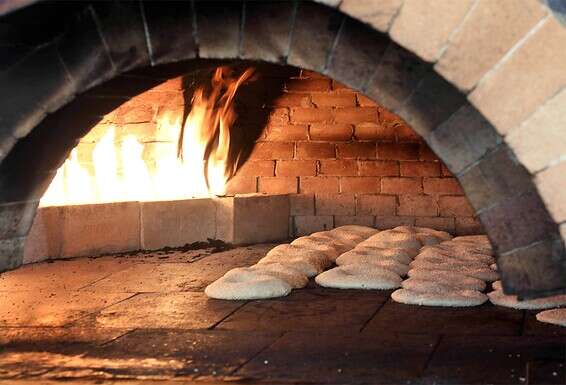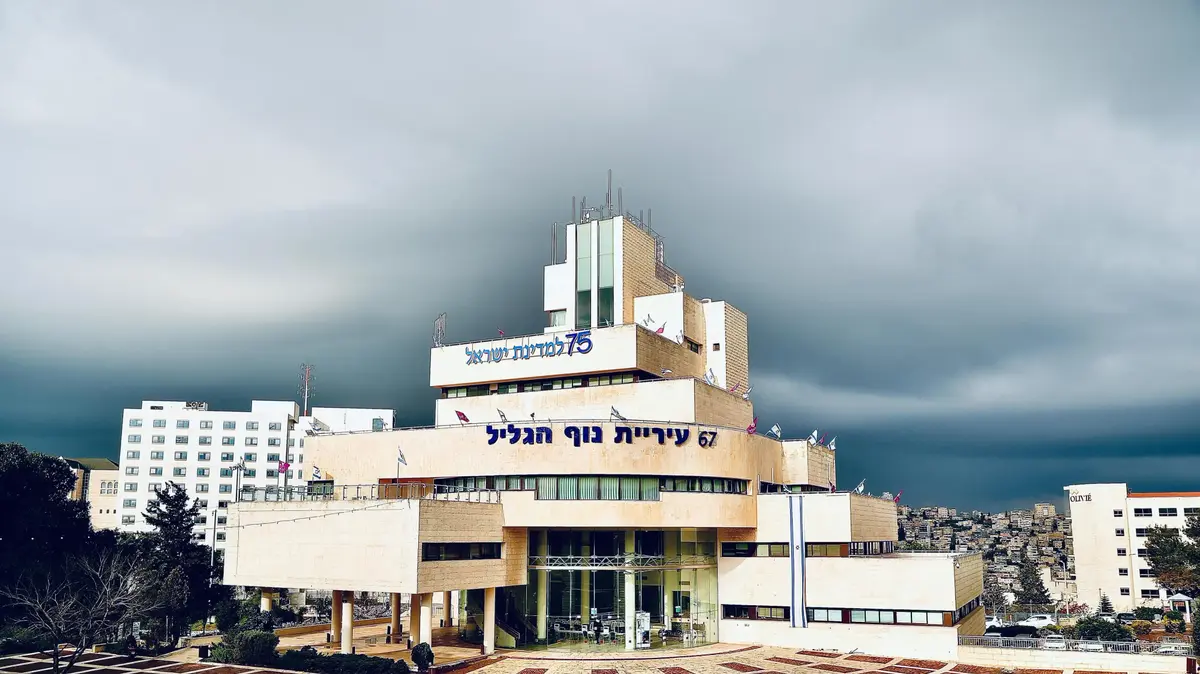Along with the pitas and pretzels whose name has spread far and wide, during Ramadan you will find cheese pastries and eggs to break the fast, Hanukkah donuts, and at Christmas - sweet in the form of Santa Claus • "I do not believe in religion, I believe in humanity," says Walid Abulafia Peace
"'Derech Eretz preceded the Torah', we were taught."
The Walid brothers (on the left), Ahmad and Khaled Abulafia
Photo:
Efrat Eshel
This happened exactly 20 years ago, on the eve of Passover 2001. From the window of the Abulafia family's bakery, which was closed all holiday, a steaming cloud of hot dough rose, washing Jaffa Street, waking the nostrils of the moves in Clock Square.
Smell of fresh pitas, on their way to catch those who snatched the celebrants.
Khaled Abulafia was then 39. He sat down on the chair to greet the rising day, when in front stood a man with a bandana tied around his neck.
It amused him.
"He was dressed like a cowboy. I asked him, 'What is it? Purim now?'" He says in a kind of restraint reserved for those who changed the details over and over again, maybe that way he would lose power, become less frightening.
But David Amuyal, a 28-year-old resident of Rishon Lezion, did not answer him, just pulled out a gun, fired a bullet into Khaled's chest and fled.
Khaled himself does not remember the shot, only the blood that erupted, and how he got into the car of a customer from Herzliya who was standing in line, and it flew him to Wolfson Hospital.
"Poor thing, may God bless him, did not know the way. And I direct him, give him blows to the back to hurry, and with the other hand presses on the wound, as if I understand what I am doing."
It was the last stop in Amuel's shooting spree, which went out to assassinate Arabs because he claimed they posed a danger to national security.
He was arrested, confessed to attempting to murder three Israeli Arabs in Rishon Lezion and Jaffa, and was sent to prison for ten years.
That night left Khaled, 59, physically and mentally injured.
The boy who loved numbers and hated violence, who hated the school because the teachers beat his palms on the bar, has to this day avoided confrontations when a passer-by grabs his disabled parking space, which he received following the injury.
The Abulafia family, which is behind a long line of activities to encourage sustainability in Jaffa, donated $ 100,000 to the restoration of the Jewish synagogue in Jaffa Clock Square, and printed T-shirts with Hebrew, Arabic and English shirts - "Arabs and Jews refuse to be enemies."
Only to Adv. Bnei Nahari, a close friend of theirs who defended Amuyal at trial, did the family members fail to file the second cheek, and severed ties with him.
"It's all a matter of education," say Ahmad, Walid and Khaled, the brothers of the Abulafia family, as I try to find out the roots of their insistence on the path of compromise and peace.
Family members have been walking in a minefield for years, knowing that behind their backs some see them as traitors.
According to one version, their forefathers came from Valencia, beginning with a forbidden love story between a Jew and a Muslim, which ended in the exclusion and growth of their industry.
"I do not believe in religion, I believe in humanity," says Walid, 56, the youngest of the seven children of Nuzha and Said Abulafia, peace be upon them.
Walid, a real estate man and who runs the bakery, reiterates the importance of education, its place in striving for equality. His four children have all studied at leading universities in the US in economics-related professions, some have already returned to Israel and work with Dad.
"The wisdom of pretzels, the wisdom of pretzels," he emphasizes again.
"We should behave like human beings, 'Derech Eretz preceded the Torah,' that's how we were taught."
And as much as I try to find out how education stands in the face of a changing reality, how to embrace the establishment and the racist discourse on the street and in the House of Representatives, the Abulafia brothers do not see another option.
They tell of Jaffa where they were formed.
On the immigrants from Morocco and Romania, with whom they shared public spaces in their parents' house or in their grandmother's house.
"There was no racism in '67, nor in '73," says Ahmad, the third of the children and the eldest son.
"Our friends have lost children in the military. The heart does not face the bereavement of parents to a single son, no matter who his God is."
Walid is full of praise for the mayor for his contribution to Jaffa, and also to Bibi, "whose abilities cannot be taken away from him."
"And what about the law of nationality?"
I ask, but Walid says that between evil and good, Netanyahu has the right to do good.
* * *
I turn to Abed (27), Walid's son, who graduated in economics and business administration from Columbia University in New York.
Perhaps in the younger generation I will find some rebellion, some kick in the endless tolerance of the parent generation, words that do not frighten themselves.
But he says that "education is the answer to racism, it is what eliminates gaps and inequality."
The days before the fourth election, and Ahmed, under the responsibility of a big brother, wants to add a few kind words about Ganz and Lapid, and even about Yvette, who is "a man with a word, nice. His mother lived in Jaffa."
When I call him after the election to ask his opinion on the results, and if there is anything pleasant in Arab parties that will be the tongue in cheek, Ahmad will be careful with words.
"God forbid we go to the polls again," he would tell me.
* * *
In 1897, Masoud Abulafia opened his bakery with a few pennies he saved while working in the small bakery he owned in the Manshiya neighborhood, during the years when the Arabs of Jaffa still lived on the lands of what would become Neve Tzedek.
Massoud gave birth to Ahmad, who bore Said, an only son, who bore two daughters and five sons, establishes the annals of the Abulafia family.
In Jaffa, as in Jaffa, care must be taken.
"It's not enough to be good," as Walid says, "you have to be smart. My father died at the age of 43, on his birthday he went. My mother was left with seven children. I, the youngest, was 11. We boys became breadwinners, and the sisters The big ones were our little mothers.
"Mom knew how to hug us all, save a penny for a penny so we wouldn't have to sell the bakery, make sure we had everything we needed, and keep no one from coming to the street."
In 2013, at the age of 75, Noza was born after an event Khamis, the most famous of her children, often told me with great admiration about her power and her intellect, and how she well nurtured and embraced and kept everyone together, even when the children grew up and financial disputes erupted between them, some that also reached the courts. Of the family, learned not to light the fire over the pages of the newspaper and found a compromise, which gave rise to divisions in the kingdom. Abulafia branches, cut off from the mother bakery in Jaffa, opened in Rishon Lezion, Petah Tikva, Tel Aviv Port and Ibn Gvirol. Restaurants and other businesses opened under the name It's in large families, when everyone wants, so the bakery in Jaffa, like the shawarma that opened opposite, added the letter W to the name, so that everyone would know and it would be clear to them
Which are run by Walid and Ahmad.
Khaled says that in the house they came from, money was never the story.
"When I opened my eyes, all I knew was Dad and Mom. We knew nothing about life and we didn't look at money. Our head was engrossed in how to move forward in life, how not to lose what the roots left behind. We continued on the path of parents and siblings."
All of Abulafia's bakeries make sure to close the gates every Passover week and on Yom Kippur, out of respect for the neighbors.
Respect in the closed shutters and respect in the stoves.
At Ramadan you will find cheese pastries and eggs to break the fast, at Hanukkah donuts.
At Christmas, sweets are decorated in the image of Santa Claus.
Honor with sugar for the people of Jaffa who celebrate, no matter what religion.
But most of the place's strength comes from its everyday pastries, from the ability to bake memories for immigrants from the countries of origin - boasting the Ottoman baking tradition, from the Balkans, Poland or Northern Europe.
* * *
In 1914 they specialized in making loaves of German bread, baked for a long time over lemon and olive trees, which were the most expensive of all.
The immigrants brought with them pretzels that enriched the selection, and today you can find here a Jerusalem pretzel, a Turkish pretzel, which is crispier than the others, and also a pretzel that came with the Germans and a Romanian pretzel, both of which, like the cakes that came with Eastern European bakers, are boiled in boiling water. Caramel, which paints their faces a bright brown.
There are pitas with hyssop and some with onions or scrambled eggs, which have been with the Abulafia family since the 1950s, long before the whole city painted the surface of its dough in pizza or olive sauce.
But at the top of the pyramid, in the crown of Abulafia's making, stands a pretzel invented by Ahmad when he was 14, a development born of the pretzel that the family members were familiar with on the football fields.
A relatively flat pretzel, with a sweet dough and a densely carpeted rug with sesame seeds, and when you bite into it, there is a salty and sweet kind in your mouth, which immediately produces a hunger for the next bite.
I first heard about him from Maromi Hanoch, a friend, who told me about him when she was a little girl in the Democratic school, and during breaks they would jump to eat sesame seeds, that's what she called this pretzel.
She said she tried it at other bakeries, but it was never the same.
A jubilation of remembrance spreads in space as the Abulafia brothers count the children of Jaffa who grew up on their pretzels.
Haim Ramon and his uncle Rosenstein, Hannah Leslau, Yona Elian.
"And he was also the director of your newspaper, to this day he came. Well, the name escaped me. He did not live here, only studied at the College de Ferrer."
Boaz Bismuth was 7 years old when he started studying in Jaffa, and to this day he remembers the options that faced a child's hunger at recess.
In Zvi's grocery store, it was possible, for 25 agorot, to get half a loaf of bread "Eilat", with mustard and sausage.
Those who had a little less replaced the sausage with cheese.
In Abulafia it was possible to buy a sesame pretzel, and if you had no money at all, one smile could make you a regular pita.
Probably to little Bismuth, who was a good friend of Ramond Gandor, the neighbor of the Abulafia family.
"When I hear about all the noise they made from the pitas - pita laughing, pita crying, pita smiling - I think of the longing we had except what he had," he says, adding that to this day, when he wants to make his mother happy, he sees the clarity return. To bring her pita zaatar from Abulafia.
"I was a traditional child who came from a kiddush house, and I would admire that they close on Passover. When the Sultan bakery opened in front of them, I was furious. I did not understand how such a competition could be held. But Abulafia explained to me that everything is fine, that competition is good for business."
* * *
From a young age it was clear to them that Khamis, even though he knew the craft of dough, was in the business of words and thought.
He was a journalist and a publicist and a media man, a great preacher of coexistence and a gifted dancer among the drops of the complex reality of this country.
The last time we were in touch was last June, around a protest by the Arabs of Jaffa, which then sparked a demand to stop construction work on a street house on the site of the al-Assaf Muslim cemetery, which ceased operations in 1915.
The streets of Jaffa burned, a bus crashed, a city hall was set on fire, the United States warned its citizens not to come to the city, as if there were any tourists who longed for it now. "Hi Hila," Khamis answered after countless phone calls, "Dogri, the situation is dangerous and educated at the time. Idum.
But I am ready to help you with a list of eloquent interviewees who reflect the two camps. "
Last October, Khamis fell ill in Corona and was hospitalized for many days. Before joining the ventilator, he called his brothers daily to demand their safety and ask them to maintain family unity. As he recalls the last sentences he heard from his brother: “Keep the name left by Dad and Grandpa.
I trust in you, and may God help you.
When all this is over, we will continue to talk about everything. "Khalim sent a recorded message to Walid, asking him to donate to orphans and to pray for him.
On November 27, at the age of 60, Khamis surrendered to Corona and ascended to heaven for his mother's embrace, with whom he made sure to eat lunch every day. He left behind a wife, two children and five grandchildren.I
stand among all the abundance on the shelves, listening to the fire burning in the oven and stoves, some standing there country place, others replacing stoves built by the Turks, excellent craftsmen, whose stoves held more than a hundred years. In gas, diesel and electricity, every period and its means, and I recycle my nostrils after the smell of burning charcoal, the ones that in the 2021 version are used to perfume modern baking in the beginning scent.The
streets of Jaffa are empty, the ear misses excessive music coming out of some cafe, and the Abulafia brothers want to taste all kinds The pretzel, from the sambusak, and also a bit from the Syrian malabi, "unlike what you get anywhere else." And I look into their eyes, that like those of Khamis, and like their words, there is something funny.
In honor of spring I wish he could be different, and honor all the countrymen wherever they are , I bring you three recipes from the classics of A. Bakery
Bulafia.
Insist on the path of peace
After the death of Khamis Abulafia, I went back to digging into correspondence between us. I found what he wrote to me in 2015, when he was interviewed for a large article I prepared for this supplement about the tension in Jaffa. Asked me to keep things to my eyes only, because "this is neither the time nor the time," even though it is always the time for such a story. "Once, at the right time, they will see the light," he said.
In honor of all the people of Abulafia, in honor of those who insist on the path of peace, those who pay a price between the two camps, I publish here what Khamis sent me, the boy who loved all the words, no matter what language.
* * *
"Here is a story that warms the heart and removes the cold from its rooms. The same deadly cold that has infiltrated our hearts, under the auspices of the wave of violence that is raging in our districts and threatening to freeze our limbs from movement and our minds from healthy thinking.
" In 1991, Muhammad Abdul Gani He tried to protect himself with a young Jew, who ran into his shop, possessed by monsters and plagued by fear and anxiety, from the terror of a murdered man who held a sword in his hand and bore the name of his God in vain.
The late Muhammad hid the terrified young woman behind him and separated her from the same killer, who was alleged to belong to Hamas.
"After learning of his Arab-Muslim identity, the killer asked Muhammad to step aside, in order to kill that innocent girl, unhindered and without a savior. 'What if I move aside,' Muhammad shouted at him, 'about my dead body. You will not hurt the girl. The slander of the God of Islam.
"" The terrorist saw that his efforts would not move his neighbor Muhammad to step aside to carry out his plot, swung his sword, split Muhammad's head in two and stabbed the Jewish tree to death.
Muhammad and Ilanit, two cousins, the descendants of our ancestor Abraham, peace be upon him, were raised to a stake in the guise of morbid hatred, which has been raging in our provinces for ages and ages.
"Despite the tragic and cruel end, some see Abdul Gani's heroic stance and stand upright in defense of a miserable young Jewish woman he has never met, a shimmering light in the dark tunnel of the Arab-Israeli conflict. Waist and roll up your sleeves in the war for a glimmer of hope.
"The late Chich picked up the gauntlet at the time and earned Abdul Gani the respect he deserved, when he changed the name of my street from" Tribes of Israel "to" Muhammad Abdul Gani "- a sign of appreciation and respect for a simple person , That Gamma took a huge step in the tunnel of darkness towards the flickering light at the end of the tunnel.
We must not betray the legacy of Muhammad and Ilanit.
That we were not mistaken in thinking that our path would be paved with flowers.
She will be a genus in stinging hooves.
We have to prune the weeds in both camps. "
The recipes of Abulafia
Hyssop pitas
There is debate as to whether it was in the 1950s or 1960s, when Grandpa Ahmad put them in the selection.
Whatever it is, these pitas should be eaten near the exit of the oven.
The amount is good for 12 pitas.
Ingredients:
√ 1 kg flour
√ 2 tablespoons dry yeast
√ 1 teaspoon sugar
√ 1 tablespoon salt
√ 1/2 2 cups lukewarm water
√ 1/4 cup olive oil
For the coating:
√ Olive oil for spreading
√ A mixture of ground hyssop and sesame seeds of good quality
In a large bowl, mix the flour with the yeast and sugar.
Make a hole and pour into it 2 cups of lukewarm water, the salt and olive oil.
Begin to knead, and while stirring add the extra 1/2 cup of water.
When the dough crystallizes, wrap in cling film and swell at room temperature for an hour, or until the dough doubles in volume.
Preheat oven to 190 degrees, transfer to a floured surface, put the dough again and divide into 12 balls.
Roll the dough balls on a floured surface to a thickness of 2 cm, place on a baking sheet lined with baking paper and let them rise for another 20 minutes. Brush each pita generously with olive oil, sprinkle over the hyssop mixture and bake at 190 degrees for about 20 minutes, until That the pitas brown at the edges.
Sesame pitas are sweet
This is the pretzel recipe.
Diligents are invited to wink a circle in the middle, but you can leave them like that.
Note that you are using sesame seeds for reasons of smell.
The amount is good for about 20 pitas.
Ingredients:
√ 1 kg flour
√ 8 tablespoons sugar
√ 2 tablespoons dry yeast
√ 1/2 2 cups water
√ 1/2 1 teaspoon salted
For the coating:
√ Water
√ Sesame
In the mixer bowl place all the dough ingredients, except the salt, and put 7 minutes.
If you do not have a mixer, start by manually kneading in a bowl that will combine the ingredients, then switch to vigorous kneading with the help of the palm pad.
Add the salt and continue to knead for another 2 minutes.
Wrap in cling film and let the dough rise for about an hour.
Divide the dough into 20 balls of the same size, cover and let rest for 20 minutes.
After that, using a rolling pin, roll each ball into a round or elliptical pita, if you prefer.
Sprinkle on a tray a nice layer of sesame seeds, fill a bowl with water, dip the pita in water and gently transfer to a tray with the sesame seeds, the surface of the pita facing down.
Tighten slightly, lift gently, turn and place on a baking sheet lined with baking paper, sesame seeds facing up.
Bake 12-14 minutes, or until the edges of the pitas begin to turn golden.
By no means do I want to convey that I recommend for the mother to be inactive.
Sambusk cheese and beet leaves
Sambusk who travels between sweet and salty and spicy.
Simple and crazy.
The quantity is good for about 25 units.
Ingredients:
√ 1 kg of flour
√ 4 tablespoons sugar
√ 3 cups water
√ 1 teaspoon wiped dry yeast
√ 1 tablespoon salt
√ 1/4 cup olive oil
√ 1 tablespoon vinegar
For the filling:
√ A bunch of Turkish spinach leaves or a bunch of
chard leaves
√ 3 tablespoons olive oil
√ 1 finely chopped onion
√ 1 fresh hot pepper free of seeds and finely chopped
√ Salt
√
Grated
black pepper
√ 250 g grated feta cheese
√ 1 tablespoon honey
√ 2 eggs Shattered
In a small bowl, dissolve the yeast with a tablespoon of lukewarm water and a teaspoon of sugar and wait 5 minutes until dissolved.
Put the flour, sugar, vinegar and water in the mixer bowl, and process for 7 minutes until the ingredients are combined.
Add the yeast, put another minute, and add the olive oil and salt at the end.
Put another 15 minutes, until a smooth and uniform dough is obtained.
Cover with cling film, puff for an hour and divide the dough into about 25 identical balls.
Now prepare the filling.
Separate the leaves from the hard parts of the stem (this is especially true if you used chard) and chop coarsely.
Heat the olive oil in a pan and fry the onion until transparent.
Add the hot pepper and fry until browned.
Rinse the spinach or chard leaves, and without drying add to the pan.
Add salt and pepper, continue to fry for another 5 minutes and remove from the heat.
Now for baking.
Preheat oven to 200 degrees and roll out the dough balls into a circle about 13.5 cm in diameter. Place 2 tablespoons of the chard mixture on half of the circle, sprinkle over feta cheese and drizzle with a little honey. About 15 minutes.
hillaal1@gmail.com







